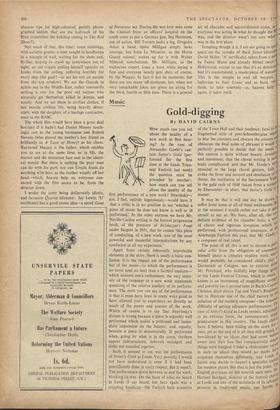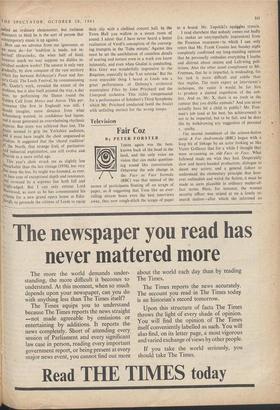Music
Gold-digging
CAIRNS By DAVID
Apart from certain inherently improbable elements in the story, there is surely a basic con- fusion. It is the impact not of the performance but of the music—to which the performance is no more (and no less) than a faithful medium— which arouses one's enthusiasm; the very inten- sity of the response to a new work transcends questions of the relative mastery of its perform- ance. The most you can say of the performance is that it must have been in many ways good to have allowed you to experience so directly so much of the power and essence of the work. Which of course is to say that Stravinsky's dictum is wrong because a piece is arguably well performed which makei a profound and imme- diate impression on the listener; and, equally, because a piece is demonstrably ill performed when, going by what is in the score, rhythms appear indeterminate, intervals smudged, and notes not sounded together.
Such, it seemed to me, was the performance of Sutter's Gold at Leeds. Very possibly I would not have understood it even if it had been punctiliously done in every respect. But it wasn't. The performance stood between us and the work, blocking its way. On the basis of what we heard at Leeds (I say heard, but here again was a crippling handicap—the Turkish bath acoustics of the Town Hall and their tendency, fatal tottr fragmented style of post-Schoenbergian nose' to blur the contours and obscure the colours a obliterate the final notes of phrases) it would perfectly possible to decide that the music this cantata is quite without beauty, inventter and movement, that the choral writing is need' lessly complicated, and that Mr. Goehr's stP unsuited to the large choral gesture, fails , evoke the fever and turmoil and desolation of Ir theme, the mutilation of the Sacramento Vane' in the gold rush of 1848 (taken from a scena° by Eisenstein)—in short, that Sutter's Gold i5 stumer. It may be that it will one day be shownt1 suffer from some or all of these weaknesses. P`; at the moment would rather not take it liP°i myself to say sp. We have, after all, the veri definite evidence of his chamber Suite, a Oro of charm and vigorous invention which tyk performed, with professional assurance, at frl o Aldeburgh Festival this year, that Mr. Goeht a composer of real talent.
The point of all this is not to excuse a Pa, cular critic from the obligation of committriii himself about a complex modern work wili0 would probably be considered child's PlaYhef' Darmstadt or Cologne, nor to criticise ett,' Mr. Pritchard, who skilfully kept things el or the Leeds Festival Chorus, which in music knows is an instrument of magnificent stranggito and sonority (as it proved later in Bach's Cants) Christen, litzet diesel' Tag and Verdi's Requierilliel but to illustrate one of the chief factors In Ise isolation of the modern composer—the immense difficulty of getting adequate performances. toPh case of Sutter's. Gold at Leeds reveals, admitte jo in an extreme form, the contemporary tillistio predicament in this country. The Leeds cOr have, I believe, been toiling on the score Or so year, yet at the end of it all they still groped' ,e bewildered by an idiom that had never bet°'10 swum into their ken that comparatively attll,d things were bungled. Under a choirmaster vers`ve in such an idiom they would no doubt P io acquitted themselves differently, and Leeds er future may decide to import a specialist tra_i11,0 for modern pieces. But that is just the point. 14, English provinces do not nourish such men. Mr Herbert Bardgett, director of the festival chde''',fi at Leeds and one of the architects of its splend,.16 prowess in traditional music, can hardly THE SPECTATOR, OCTOBER 20, Called an ordinary choirmaster; but (without disrespect to him) he is the sort of person that contemporary music is up against.
How can we advance from our ignorance, as We must do—for 'tradition is made, not in- herited' (Stravinsky, the wiser half of him), however much we may suppose we dislike in- oeividual modern works? The answer is only very gradually, by slow conquest of the vast territory ‘vhieh lies between Belshazzar's Feast and Sut- ,.er's Gold. The Leeds Festival, by commissioning Ai r. Goehr's work, revealed the extent of the Problem, but it also itself pointed the way, a day later, by performing' the Dance round the. Golden Calf from Moses and Aaron. This per- formance (the first in England) was still, I should imagine, some distance from what Schoenberg wanted; its confidence had lapses, 411d it never generated an overwhelming rhythmic i'llpetus. But more was achieved than lost. The i)iusic seemed to grip the Yorkshire audience, and it must have taught the choir unguessed-at wisdom. It suggested that the. 'choral tradition' °I the North, that strange fruit of puritanism 'lid industrial exploitation, can still evolve and nourish in a more sinful age. This year's choir struck me as slightly less remarkable than the last vintage (1958), but very Ilk none the less. Its might was founded, as ever, "n bass tone of exceptional depth and resonance, ;NI crowned by a soprano line both full and lrght-edged. But I can only entreat Lord arevvood, as soon as he has consummated his scheme for a new grand opera house at Edin- burgh, to persuade the citizens of Leeds to equip their city with a civilised concert hall. In the Town Hall you wallow in a steam room of sound. I admit that I have never heard a better realisation of Verdi's conception of the converg- ing trumpets in the 'Tuba mirum.' Against this must be set the annihilation of countless details of scoring and texture even in a work you know intimately, and even when Giulini is conducting. Rita Gorr was wonderfully impressive in the Requiem, especially in the tux aeterna.' But the most enjoyable thing I heard at Leeds was a great performance of Debussy's orchestral masterpiece Fetes by John Pritchard and the Liverpool orchestra. This richly compensated for a performance of Schubert's Third Symphony which Mr. Pritchard conducted (until the finale) with unfailing instinct for the wrong tempo.







































 Previous page
Previous page